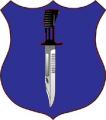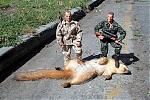Started this thread, because I think this is spot on the money.
I like it because I think it is essentially correct. I hate it because this guy is saying everything I, and quite few other SWJ folks, have been saying for a long time, but just says it better. Plus being a Brigadier, can't hurt.
(I don't defer to rank, but the authoritarian tendency within most hierarchies does.)
I don't expect the "COIN-oil" folks to agree, but war is war, and winning wars hasn't really changed in 3,000 years.












 .
.







Bookmarks